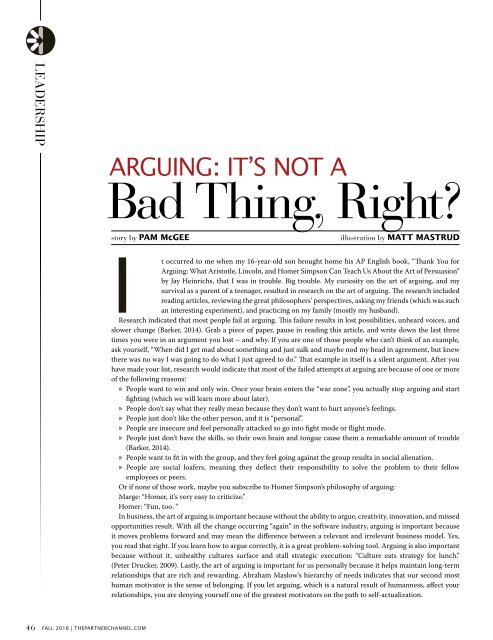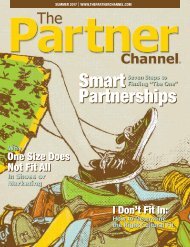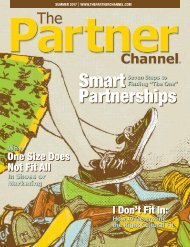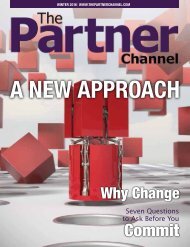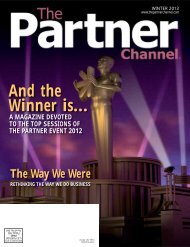The Partner Channel Magazine Fall 2016
This issue centers around the announcement of Microsoft Dynamics 365 and what it means for Partners in the channel. Dig in to explore more Microsoft-focused hot topics.
This issue centers around the announcement of Microsoft Dynamics 365 and what it means for Partners in the channel. Dig in to explore more Microsoft-focused hot topics.
You also want an ePaper? Increase the reach of your titles
YUMPU automatically turns print PDFs into web optimized ePapers that Google loves.
LEADERSHIP<br />
ARGUING: IT’S NOT A<br />
Bad Thing, Right?<br />
story by PAM McGEE<br />
illustration by MATT MASTRUD<br />
It occurred to me when my 16-year-old son brought home his AP English book, “Thank You for<br />
Arguing: What Aristotle, Lincoln, and Homer Simpson Can Teach Us About the Art of Persuasion”<br />
by Jay Heinrichs, that I was in trouble. Big trouble. My curiosity on the art of arguing, and my<br />
survival as a parent of a teenager, resulted in research on the art of arguing. <strong>The</strong> research included<br />
reading articles, reviewing the great philosophers’ perspectives, asking my friends (which was such<br />
an interesting experiment), and practicing on my family (mostly my husband).<br />
Research indicated that most people fail at arguing. This failure results in lost possibilities, unheard voices, and<br />
slower change (Barker, 2014). Grab a piece of paper, pause in reading this article, and write down the last three<br />
times you were in an argument you lost – and why. If you are one of those people who can’t think of an example,<br />
ask yourself, “When did I get mad about something and just sulk and maybe nod my head in agreement, but knew<br />
there was no way I was going to do what I just agreed to do.” That example in itself is a silent argument. After you<br />
have made your list, research would indicate that most of the failed attempts at arguing are because of one or more<br />
of the following reasons:<br />
» People want to win and only win. Once your brain enters the “war zone”, you actually stop arguing and start<br />
fighting (which we will learn more about later).<br />
» People don’t say what they really mean because they don’t want to hurt anyone’s feelings.<br />
» People just don’t like the other person, and it is “personal”.<br />
» People are insecure and feel personally attacked so go into fight mode or flight mode.<br />
» People just don’t have the skills, so their own brain and tongue cause them a remarkable amount of trouble<br />
(Barker, 2014).<br />
» People want to fit in with the group, and they feel going against the group results in social alienation.<br />
» People are social loafers, meaning they deflect their responsibility to solve the problem to their fellow<br />
employees or peers.<br />
Or if none of those work, maybe you subscribe to Homer Simpson’s philosophy of arguing:<br />
Marge: “Homer, it’s very easy to criticize.”<br />
Homer: “Fun, too. “<br />
In business, the art of arguing is important because without the ability to argue, creativity, innovation, and missed<br />
opportunities result. With all the change occurring “again” in the software industry, arguing is important because<br />
it moves problems forward and may mean the difference between a relevant and irrelevant business model. Yes,<br />
you read that right. If you learn how to argue correctly, it is a great problem-solving tool. Arguing is also important<br />
because without it, unhealthy cultures surface and stall strategic execution: “Culture eats strategy for lunch.”<br />
(Peter Drucker, 2009). Lastly, the art of arguing is important for us personally because it helps maintain long-term<br />
relationships that are rich and rewarding. Abraham Maslow’s hierarchy of needs indicates that our second most<br />
human motivator is the sense of belonging. If you let arguing, which is a natural result of humanness, affect your<br />
relationships, you are denying yourself one of the greatest motivators on the path to self-actualization.<br />
46 FALL <strong>2016</strong> | THEPARTNERCHANNEL.COM


